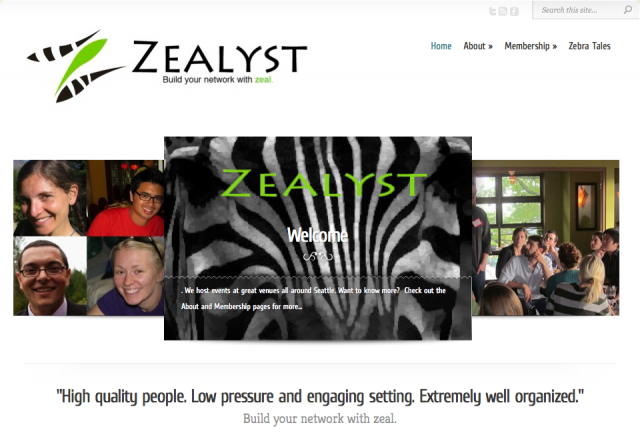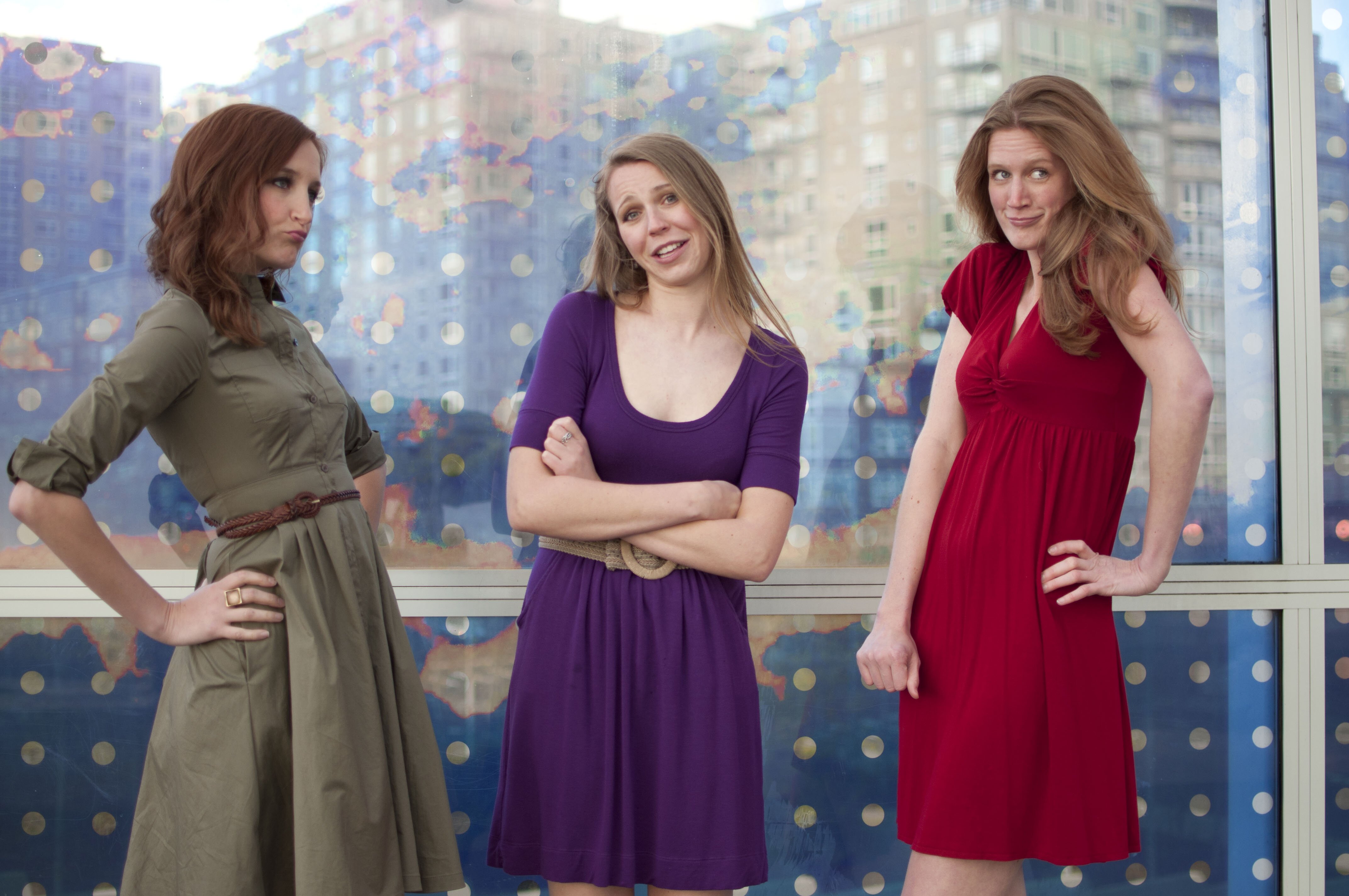
I mentioned Nerve Dating‘s arrival in Seattle, so it’s only fair to spotlight homegrown networking-event startup Zealyst, though they would be the first to tell you that they’re not a dating site–in fact right now they find themselves catering equally to the needs of a variety of business clients, helping their employees create and cultivate their professional relationships.
But they do share with Nerve a method for bringing together people who, chances are, will get along famously, and for helping everyone to overcome that initial awkwardness of the first meeting. “We lay the groundwork for serendipity,” is how co-founder Martina Welke likes to put it. How Zealyst does that requires some preliminary investigation into zebra-style stripes, which represent the “zeal” in Zealyst’s name, and also the social glue that connects people.
Just about every startup has a great story, though. What matters is how it works in the wild, so I went to the Zealyst site, inquired about a membership (free, at this point), and waited for an invitation. When that arrived–“Greetings from Zealyst–a new way to mix and mingle for professionals in Seattle”–I filled out a short questionnaire about my interests and who I was hoping to meet, and waited for an invitation to a huddle, which is what Zealyst calls their themed meetups, groups of between 16 and 30, usually right around 20.
Recent huddles have been organized around “adventure” (bringing together extreme sports and travel enthusiasts), “making waves” (non-profit leaders and entrepreneurs), and “eclecticism” (marketers, dancers, and triathletes). Zealyst’s software searches out overlappings of interests in its members, so huddles offer variety, not clones. For an entrepreneurs-only huddle, attendance had to be capped, which is a clue, I think, as to why Zealyst has such potential. More on that later.
My huddle was for influencers, and the day of the meetup at Belltown’s Clever Bottle, I got an email from co-founder Britta telling me that I should look for a “musician/photographer/playwright/puppeteer. Ask him about audience/performer relationships.” Intriguing! So was the Clever Bottle setting, for that matter, since I’m a craft cocktail fan.
As it turned out, I met and spoke with a number of people that night, because if you ask someone if they are a puppeteer and they are not, the next question–“Well, what do you do?”–presents itself automatically. I met software developers, the guy behind Seattle Greendrinks, a therapist, a lawyer, and a blonde woman at the bar who wanted to know what we were all doing there.
Later we broke up into smaller groups, and brainstormed what the Zealysters called HaiClus, haiku descriptions of traits people in the group shared, that we presented to other groups. This isn’t something every huddle does–the games invented are specific to the interests of the huddle members. (Cf. “Where do the games come from?“)
After a brief, animated conversation with my huddle “target,” a few days later I was publishing his review of a play in town. Now that’s an “intentionally brokered match,” which is another way that Zealyst describes their value.

Currently, Zealyst is arranging two to three huddles per week in Seattle from their offices at Pioneer Square’s coworking space, Hub Seattle. (All social networking startups should choose coworking.) Thanks to two angel investors, Britta and Martina are working full-time on Zealyst, and will likely be bringing on their tri-founder, Holly, after another funding round.
They accept members via referrals from existing members, or through their site, but at the moment they’ve got enough of a membership base–and business interest in their “enterprise version”–to keep themselves busy. Right now, their contract work with businesses provides the bulk of their revenue stream. They plan to keep a baseline “personal” version free, but with membership benefits (advanced messaging and calendar features, special invitations) available at a paid premium level.
As for what’s next, partly that depends on who joins. Zealyst orchestrates their huddles, but the themes emerge from their algorithmic data-mining of membership interests. For instance, in Seattle, people who like food also tend to like biking. As people get the hang of it, Martina says, they often go back in and update their profile with more and more specific interests, which in turn generates new potential huddle combinations.
Not that the result feels machine-driven. Britta describes the process as a bit like building sand castles with blocks (of data). She also has a fondness for “puns and space jokes,” and injects playful tone into your Zealyst emails, to help take the social anxiety edge off. (No, you can’t bring a wingperson–see the Code of Conduct.)
In three weeks, fingers crossed, they’ll be rolling out a new site. Further developments will involve hiring huddle hosts (initially, the huddles were proposed to be self-organizing, but people want a host to welcome them), and at some point, rolling Zealyst out to new cities full of people bored with their TiVo.
The notion that “today’s professionals” want to outsource their social lives actually has little to do with today. As long as there have been professionals, they have demanded support services for the social side of life: partly because of the time constraints of their career, but also because many are not good at–let’s be clear–socializing. In earlier days, people ran salons that would have been hard to distinguish from a Zealyst huddle, though they depended solely on a hostess’s list of acquaintances and her intuitive people-matching ability.
Zealyst transmogrifies the salon, making it more fluid and adaptable, but the impulse is the same: to help introduce people who “should” know each other, and to create social events that offer the serendipity, spontaneity, and discovery needed to forge social bonds, so people stay connected.
It’s not just about handing someone a business card, but about “joining up” for a vibrant social life. Zealyst’s popularity with entrepreneurs, I think, argues for a growing demand out there, as a lot of macro-scale changes to professional life diminish the opportunities for relationships to arise out of the movements of daily life. (I’m convinced, and I say this as someone who feels ill at ease in the typical business-networking group, and who tells himself that “dating” isn’t something that serious people do, or in my case, do well at all.) We’ll just have to see where this castle can go.
